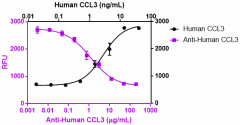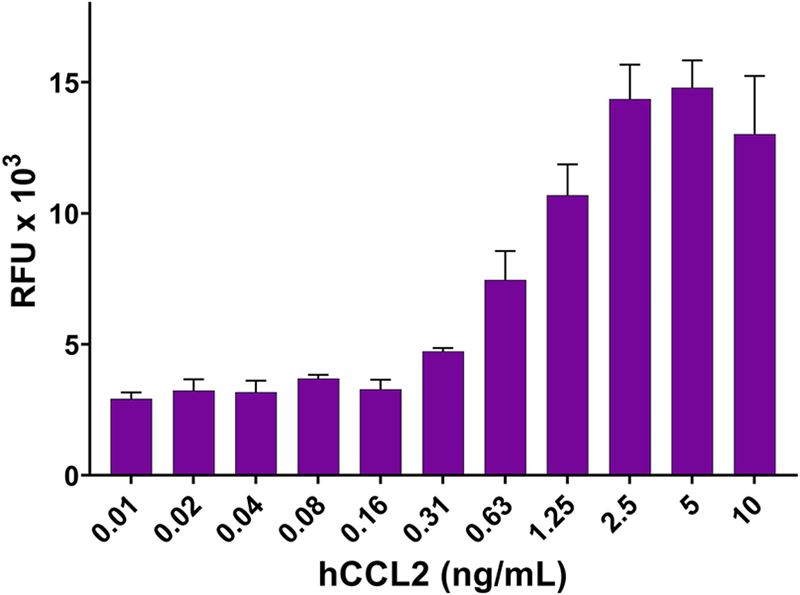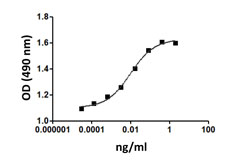- Clone
- W16009B (See other available formats)
- Regulatory Status
- RUO
- Other Names
- Macrophage inflammatory protein 1-alpha (MIP-1-alpha), LD78-alpha, SCYA3, G0S19-1
- Isotype
- Rat IgG2a, κ
- Ave. Rating
- Submit a Review
- Product Citations
- publications

-

Recombinant human CCL3 (Black Circles, Cat. No. 759506) induces the chemotaxis of mouse Baf3-hCCR5 transfectants chemoattractant cells. Anti-human CCL3 antibody (clone W16009B, Purple Squares) neutralizes the chemotactic activity of recombinant human CCL3 on Baf3-hCCR5 cells in a dose-dependent manner. The ND50 range: 2 - 8 µg/mL.
| Cat # | Size | Price | Quantity Check Availability | Save | ||
|---|---|---|---|---|---|---|
| 934603 | 100 µg | 270 CHF | ||||
| 934604 | 1 mg | 715 CHF | ||||
CCL3 is a chemokine belonging to the CC chemokine family. CCL3 is involved in activation and recruitment of lymphocytes, monocytes, and granulocytes during acute inflammation. In addition to regulating leukocyte migration, CCL3 enhances IFN-γ secretion from activated T cells and thus induces a Th1 response. Moreover, CCL3 has been reported to be involved in susceptibility to HIV infection and disease progression of AIDS. Human CCL3 is also demonstrated to inhibit proliferation of hematopoietic progenitor stem cells.
Product DetailsProduct Details
- Verified Reactivity
- Human
- Antibody Type
- Monoclonal
- Host Species
- Rat
- Immunogen
- Recombinant Human CCL3
- Formulation
- 0.2 µm filtered in phosphate-buffered solution, pH 7.2, containing no preservative.
- Endotoxin Level
- Less than 0.01 EU/µg of the protein (< 0.001 ng/µg of the protein) as determined by the LAL test.
- Preparation
- The Ultra-LEAF™ (Low Endotoxin, Azide-Free) antibody was purified by affinity chromatography.
- Concentration
- The antibody is bottled at the concentration indicated on the vial, typically between 2 mg/mL and 3 mg/mL. Older lots may have also been bottled at 1 mg/mL. To obtain lot-specific concentration and expiration, please enter the lot number in our Certificate of Analysis online tool.
- Storage & Handling
- The antibody solution should be stored undiluted between 2°C and 8°C. This Ultra-LEAF™ solution contains no preservative; handle under aseptic conditions.
- Application
-
Neut - Quality tested
- Recommended Usage
-
Each lot of this antibody is quality control tested by neutralization of the chemotaxis induced by recombinant human CCL3 on mouse Baf3-hCCR5 transfectants chemoattractant cells. ND50 range: 2 - 8 µg/mL. It is recommended that the reagent be titrated for optimal performance for each application.
- RRID
-
AB_2894523 (BioLegend Cat. No. 934603)
AB_2894523 (BioLegend Cat. No. 934604)
Antigen Details
- Structure
- CC chemokine.
- Distribution
-
T lymphocytes, B lymphocytes, monocytes, macrophage, dendritic cells, NK cells, neutrophils, basophils, eosinophils, platelets, fibroblasts, osteoblasts, astrocytes, vascular smooth muscle cells, fetal microglia, and epithelial cells.
- Function
- The CCL3 chemokine is a chemoattractant which recruits and activates leukocytes to sites of infection or inflammation, resulting in an enhanced local inflammatory response.
- Interaction
- T lymphocytes, monocytes, NK cells, immature dendritic cells, neutrophils, basophils, eosinophils, platelets, and coronary epithelial cells.
- Ligand/Receptor
- CCR1, CCR4, and CCR5.
- Cell Type
- Hematopoietic stem and progenitors
- Biology Area
- Cell Biology, Immunology, Innate Immunity, Neuroinflammation, Neuroscience, Stem Cells
- Molecular Family
- Cytokines/Chemokines
- Antigen References
-
1. Menten P, et al. 2002. Cytokine Growth Factor Rev. 13:455.
2. Blum S, et al. 1990. DNA Cell Biol. 9:589.
3. Czaplewski LG, et al. 1999. J Biol Chem. 274:16077.
4. Paximadis M, et al. 2009. Int J Immunogenet. 36:21.
5. Cocchi F, et al. 1995. Science. 270:1811.
6. Meddows-Taylor S, et al. 2006. J Gen Virol. 87:2055. - Gene ID
- 6348 View all products for this Gene ID
- UniProt
- View information about CCL3 on UniProt.org
Related FAQs
- Do you guarantee that your antibodies are totally pathogen free?
-
BioLegend does not test for pathogens in-house aside from the GoInVivo™ product line. However, upon request, this can be tested on a custom basis with an outside, independent laboratory.
- Does BioLegend test each Ultra-LEAF™ antibody by functional assay?
-
No, BioLegend does not test Ultra-LEAF™ antibodies by functional assays unless otherwise indicated. Due to the possible complexities and variations of uses of biofunctional antibodies in different assays and because of the large product portfolio, BioLegend does not currently perform functional assays as a routine QC for the antibodies. However, we do provide references in which the antibodies were used for functional assays and we do perform QC to verify the specificity and quality of the antibody based on our strict specification criteria.
- Does BioLegend test each Ultra-LEAF™ antibody for potential pathogens?
-
No, BioLegend does not test for pathogens in-house unless otherwise indicated. However, we can recommend an outside vendor to perform this testing as needed.
- Have you tested this Ultra-LEAF™ antibody for in vivo or in vitro applications?
-
We don't test our antibodies for in vivo or in vitro applications unless otherwise indicated. Depending on the product, the TDS may describe literature supporting usage of a particular product for bioassay. It may be best to further consult the literature to find clone specific information.
Other Formats
View All CCL3 Reagents Request Custom Conjugation| Description | Clone | Applications |
|---|---|---|
| Ultra-LEAF™ Purified anti-human CCL3 (MIP-1α) | W16009B | Neut |
Customers Also Purchased
Compare Data Across All Formats
This data display is provided for general comparisons between formats.
Your actual data may vary due to variations in samples, target cells, instruments and their settings, staining conditions, and other factors.
If you need assistance with selecting the best format contact our expert technical support team.
-
Ultra-LEAF™ Purified anti-human CCL3 (MIP-1α)

Recombinant human CCL3 (Black Circles, Cat. No. 759506) indu...
 Login / Register
Login / Register 












Follow Us